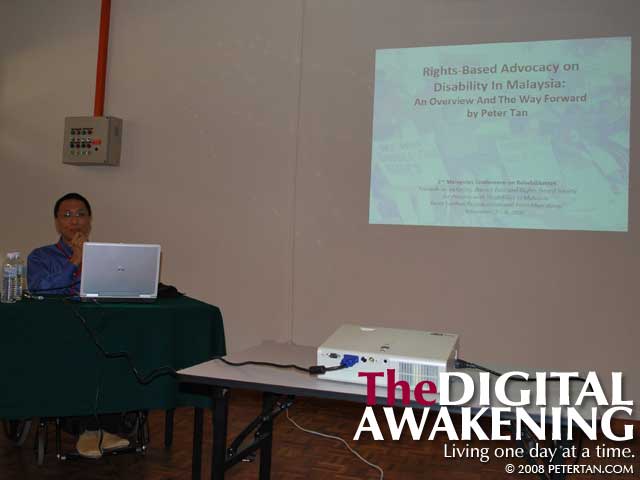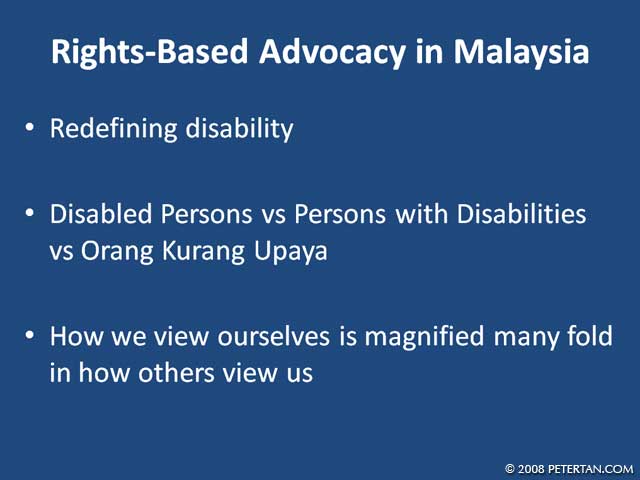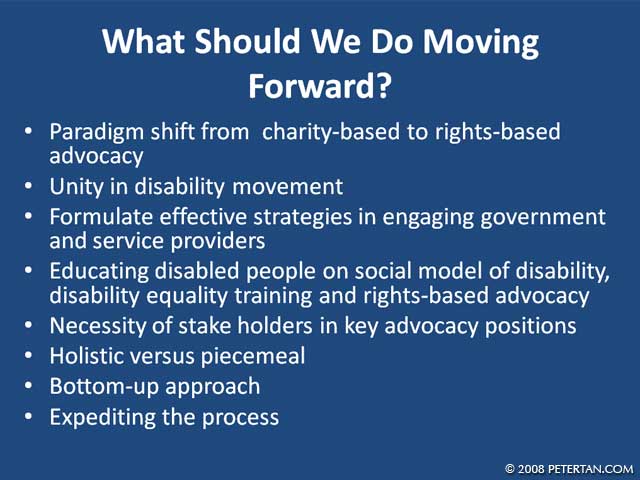Every once in a while, we will have people in high levels of the government coming out with something which they think will benefit disabled people. never mind most of these are just all form without substance. They try anyway and we have to give it to them for their effort.
The latest was by Minister of Youth and Sports Datuk Ahmad Shabery Cheek who proposed that we replace the phrase “disabled” (sic) with “people with special ability” to evoke a positive perception. I would like to thank Datuk Ahmad Shabery for this but seriously, he should have made an effort to understand disability issues in Malaysia before making “clever” statements like this.
This was reported by Bernama and picked up by The Star and New Straits Times. Replacing “disabled people” with “people with special ability” does not change anything. If at all, it is actually taking a step backwards should this term be accepted. It does not describe the social oppression and discrimination faced by disabled people, not only in Malaysia, but all over the world. In fact, at one fell swoop, the usage of this term may just put disability rights advocates out of work because with our “special ability” overcoming barriers is no longer a problem anymore.
Following that, I sent letters to The Star and New Straits Times disagreeing with Datuk Ahmad Shabery’s suggestion. I nearly choked on the water I was drinking when I read how the editor at The Star replaced the first instance of “disabled people” in the letter to “handicapped people” in my letter that was published. The title of the letter itself (The disabled just want to live life well) was found to be wanting. We are disabled people, not disabled. The word “disabled” is an adjective, not a noun. The logic here also is that we are not disabled in accessible environment and that label is moot in these situations.
“Handicapped people” and “disabled people” are not the same. Some people may even find the former offensive. The term handicapped people emphasizes on the impairment of the person as the cause of problems faced. Impairment does not necessarily lead to disability. Whether we realise it or not, many of us are visually impaired without glasses. That does not lead to disability unless we choose to forgo wearing glasses. “Disabled people” on the other hand describes the disabling conditions people experience in environment that does not take into account of the needs of everyone.
Below is the edited version of my letter published in The Star followed by the original letter.
The Star Online
News
Home > News > Opinion
Monday June 15, 2009
The disabled just want to live life well
YOUTH and Sports Minister Datuk Ahmad Shabery Cheek said handicapped people should not be referred to as “disabled” but “people with special ability” (“Disabled people have special abilities” – The Star, June 13).
As a person living with a spinal cord injury and tetraplegia, I respectfully disagree with him in this matter. For the lack of better terms, I would prefer that we stick to “disabled people,” not even “people with disabilities”.
The term “people with disabilities” puts the burden of the problem on the person.
“Disabled people”, on the other hand, describes people whose interaction in society is limited by environmental and attitudinal barriers. We are disabled by these factors which when removed also removes the disability.
Our collective desire to play an active part in society is severely hampered by the multitude of barriers that we face at every turn of our lives.
Referring to the minister’s statement that many of us are not “disabled” because we have special qualities that sometimes non-disabled people cannot even match, I would like to point out that not every disabled person can achieve such feats, nor do we desire to be super achievers of such calibre.
Likewise, not all non-disabled persons want to scale Mount Everest, swim across the English Channel or are able to sprint 100 meters in under 10 seconds.
Most disabled people want to lead ordinary, but meaningful, lives just like everyone else. Even this simple desire can be difficult to be realised for some.
The Government should spend more time resolving the outstanding issues, especially accessibility in the built environment and public transport faced by the majority of disabled people, instead of coining terms that do nothing to empower us.
What is the point of being called “people with special ability” when we cannot even get out from our homes safely because the environment around where we live is inaccessible?
Does it matter to us if the minister wants to use a supposedly more positive term to refer to us when we cannot even use public transport to move around conveniently?
We cannot escape from the fact that no matter what positive phrases are used, disabled people are still the most marginalised community in the country.
The Government should seriously work towards improving the quality of life of disabled people by removing barriers and providing relevant social support where required.
The original letter that I sent to The Star:
Youth and Sports Minister Datuk Ahmad Shabery Cheek said that disabled people should not be referred to as “disabled” but “people with special ability” (Disabled people have special abilities – The Star, June 13). As a person living with spinal cord injury and tetraplegia, I respectfully disagree with him in this matter. In fact, I find the term he suggested distasteful and patronising. For the lack of better terms, I would prefer that we stick to “disabled people,” not even “people with disabilities.”
Disability is a social construct. Steps in the built environment disable wheelchair users and people with limited mobility. Ramps do not. An inaccessible public transport system disables people. Kneeling buses with ramps and proper bus stops do not. These examples show that people are not necessarily disabled by their impairments. It is how we do things and how we build public amenities that disables people.
The term “people with disabilities” puts the burden of the problem on the person. The equivalent Malay term “orang kurang upaya” which is adopted by the government has the same meaning when it is evident that the problem of disability lies with how we build and our attitudes towards these issues. “Disabled people” on the other hand describes people whose interaction in society is limited by environmental and attitudinal barriers. We are disabled by these factors which when removed also removes the disability.
Disabled people want equalization of opportunities in society. We want to be educated in mainstream schools, colleges and universities. We want to be gainfully employed. We want to fall in love, get married and build a family. We want to participate in social, cultural, religious, political and all other activities in the communities that we live in. Our collective desire to play an active part in society is severely hampered by the multitude of barriers that we face at every turn of the corner every day of our lives.
Referring to Datuk Ahmad Shabery’s statement that many of us are not “disabled” because we have special qualities that sometimes non-disabled people cannot even match, I would like to point out that not every disabled person can achieve such feats nor do we desire to be super achievers of such calibre. Likewise, not all non-disabled persons want to scale Mount Everest, swim across the English Channel or are able to sprint 100 meters in under 10 seconds. These people represent only a small fraction of any given population and should not be considered as the norm.
Most disabled people want to lead ordinary but meaningful lives just like everyone else. Even this simple desire can be difficult to be realised for some. Datuk Ahmad Shabery and the government should spend more time resolving the outstanding issues especially accessibility in the built environment and public transport faced by the majority of disabled people instead of coining terms that do nothing to empower us. On the other hand, this also shows how ignorant certain sectors of the government are towards the real issues faced by disabled people.
What is the point of being called “people with special ability” when we cannot even get out from our homes safely because the environment around where we live are inaccessible? Does it matter to us if the Minister wants to use a supposedly more positive term to refer to us when we cannot even use the public transport to move around conveniently? These “special abilities” are certainly of not much help to us where we truly need them.
We cannot escape from the fact that no matter what positive phrases that are used, disabled people are still the most marginalized community in the country. The government should seriously work towards improving the quality of life of disabled people by removing barriers and providing relevant social support where required. So, no thank you Datuk Ahmad Shabery, let’s just stick with disabled people for now. That is who we truly are.
The respond from the Department of Social Welfare Malaysia to that letter in their website:
The Disabled Just Want To Live Life Well
We refer to the letter written by Mr. Peter Tan in The Star dated 15th June 2009 regarding “The Disabled Just Want To Live Life Well”.
The term for persons with disabilities (PWDs) is a term internationally recognized as stated in The Convention On The Rights Of Persons With Disabilities.
Regarding the issues of accessibilities raised, we would like to inform that in the National Policy for PWDs, National Plan of Action for PWDs and Persons With Disabilities Act 2008. A major provision is on accessibility. In the National Policy, the provision on accessibility states that :-
Ensure a barrier-free environment including facilities within and outside buildings, at the workplace, in residential and in public areas
Enhance the availability of disabled-friendly public transport facilities and
Promote the availability of an access to information and communications technology (ICT)
National Council For Persons With Disabilities set up under the Act has formed a Committee on Accessibility and Universal Design to propose appropriate action to address issues on accessibility. Among the programmes that have been carried out include access auditing on all public places and facilities to determine how accessible the physical environment is to the PWDs. The Department for Development of PWDs will also undertake advocacy to local authorities, architects, engineers, and planners to raise awareness on barrier-free facilities and compliance to by-laws already in place. It is hoped that through these efforts, the issues of accessibility can be addressed.
Thank you.
Public Relation Officer
Department of Social Welfare



